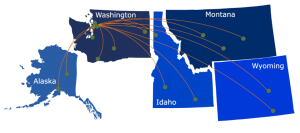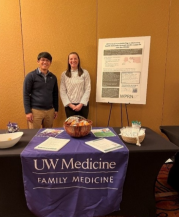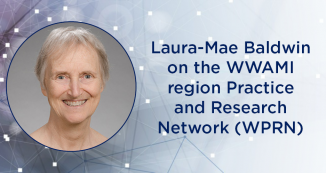
13 Jun “Project Alaska” Aims to Build Connections and Reduce Disparities
The ITHS profile series is meant to shine a deserving spotlight on individuals or programs within ITHS doing critical work across the vast spectrum of translational science. In our June installment, we are focusing on a promising new DEIA initiative from WPRN (WWAMI Region Practice and Research Network) called Project Alaska. The goal of Project Alaska is to enhance healthcare for Alaskans, including Native populations, by fostering research collaborations with primary care practices.

The WPRN is a network of more than 120 primary care practices across the 5-state WWAMI region, meant to support collaboration between primary care practices and academic researchers on research that improves the health and well-being of patients in their communities.
Now, Project Alaska aims to engage primary care clinics across the largest state in the nation to better understand and address the unique healthcare challenges faced there. For scope, in 2022, the state of Alaska had a population of just over 733,000 people, spread over an area more than twice as large as the state of Texas. While improvements have been made in recent years, Alaska is still underrepresented in research – an issue identified during a recent Equity, Diversity, and Inclusion (EDI) discussion within WPRN. That conversation highlighted the need for improved research representation in Alaska, which then led to the formation of this project.
The project’s target audience includes diverse Alaskan communities, with a particular emphasis on rural and frontier areas that are often underrepresented in translational research. Initial efforts are statewide, initially broad but expected to become more focused on regions with smaller and harder to reach populations.
Dr. Sebastian Tong, associate director of the WPRN, emphasized the need to address healthcare disparities in Alaska’s diverse, rural, and remote communities: “Our approach to providing resources to Alaskan primary care practices is rooted in a commitment to understanding and meeting their needs. Rather than imposing expectations, we prioritize listening and learning from the community to tailor our support accordingly.”
One of the long-term goals of this project is to support translational health research within the Native populations in Alaska. Monica Zigman Suchsland, a research scientist with WPRN, says partnership is key: “We plan to build a collaborative pathway. We hope to learn about their research program and initiatives, and we also want to offer WPRN resources and develop a collaborative model to share translational research opportunities.”
The WPRN team is employing a network-wide approach to connect with new practices, leveraging relationships with individual investigators, past learners, and professional contacts. This engagement aims to address significant healthcare access and outcome disparities. By building these relationships, WPRN seeks to integrate research into clinical settings, improving overall healthcare practices.
The hope is that through these new collaborations, Project Alaska project will promote equitable healthcare for underrepresented populations, including Indigenous communities.
Connecting with Communities
A big part of Project Alaska is learning what works for the communities being served, to help shape the future of primary care practice.
For Zigman Suchsland, that means learning and listening. “We seek to learn from these practices to improve our understanding of healthcare delivery in Alaska, and inform future research initiatives,” says Zigman Suchsland. “By establishing relationships with primary care practices, we hope to facilitate the integration of research into their clinical settings and enhance overall healthcare practices in the region.”
Another essential part of this initiative is having cultural humility, says Zigman Suchsland, who says, “Our journey toward cultural humility is ongoing. Our recent efforts, such as our trip to Alaska and engagement with the Alaska Native Tribal Health Consortium, have been important steps in our cultural competency journey. Moving forward, we are committed to continuing the conversation and exploring opportunities to enhance our understanding and communication with underrepresented populations.”
Ultimately, the project aspires to improve healthcare delivery and outcomes in Alaska by empowering primary care practices through research collaboration, informed decision-making, and reduced disparities in patient care.
Project Alaska’s impact will be measured both quantitatively, by tracking metrics like practice enrollment and research participation, and qualitatively, through stakeholder feedback.
“Through ongoing dialogue with stakeholders and reflective evaluation, we aim to gain insights into the evolving needs and perspectives of the Alaskan primary care community,” says Zigman Suchsland.
“By enhancing representation and engagement in research, we hope to empower primary care practices to better understand and address the health needs of their communities,” says Dr. Tong. “This, in turn, can lead to more informed decision-making, improved patient care, and ultimately, better health outcomes for all Alaskans.”
About the WPRN
The WPRN is a primary care, practice-based research network in the five-state WWAMI region (Washington, Wyoming, Alaska, Montana, and Idaho). These clinics are found in both rural and urban settings and include community health centers, private and academically-affiliated practices, and government-operated clinics.
The WPRN is coordinated by a central hub that provides researchers with the necessary tools and connections to conduct collaborative research in community-based primary care settings.
The overarching goal of the WPRN is to support collaboration between primary care practices and academic researchers on research that improves the health and well-being of patients in their communities and enhances primary care clinical practice.
ITHS provides support for WPRN activities, including funding time and travel expenses. This support enables WPRN’s engagement with primary care practices in Alaska, allowing members to attend relevant meetings and conferences, and to facilitate collaborative research efforts.
—
Interview by Mihila Gomes. Edited by Lisa Stromme Warren. If you have a story suggestion for the ITHS Interview Profile series, please send your ideas to Lisa Stromme Warren.










